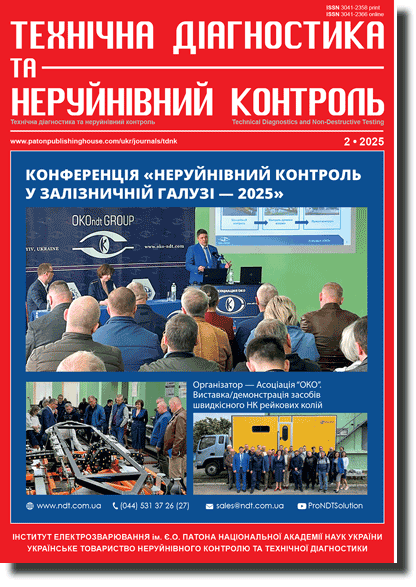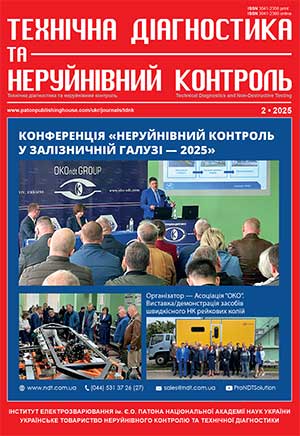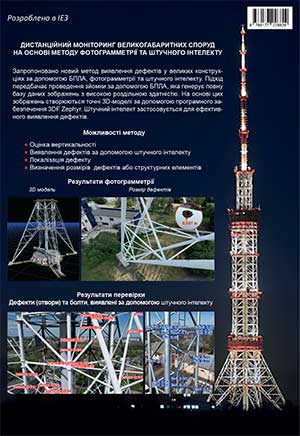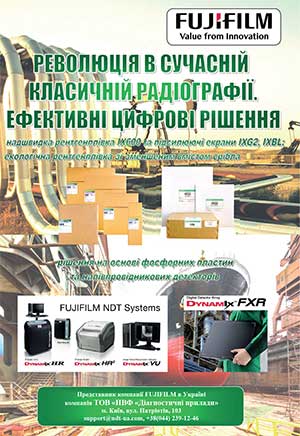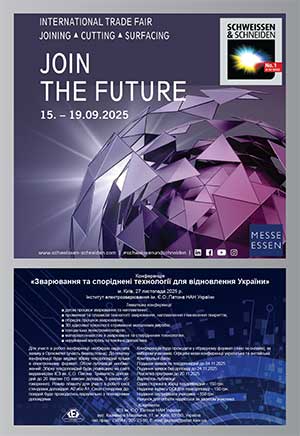| 2025 №02 (01) |
DOI of Article 10.37434/tdnk2025.02.02 |
2025 №02 (03) |
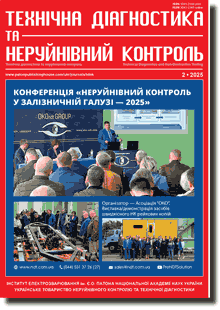
"Tekhnichna Diahnostyka ta Neruinivnyi Kontrol" (Technical Diagnostics and Non-Destructive Testing) #2, 2025, pp. 12-17
Research of the eddy-current resonance method for measuring the thickness of the carbon fiber reinforced plastic layer on metallic structures
V.N. Uchanin1, O.G. Aleschenko1, A. Savin2, V.Ja. Derecha3
1G.V. Karpenko Physico-Mechanical Institute of the NAS of Ukraine. 5 Naukova Str., 79060, Lviv, Ukraine. E-mail: vuchanin@gmail.com2Nondestructive Testing Department, National Institute of Research and Development for Technical Physics, Iasi, Romania. E-mail: asavin@phys-iasi.ro
3SE «ANTONOV». 1 Mrija Str., 03062, Kyiv, Ukraine
The possibility of non-contact measurement of a carbon fiber reinforced plastic (CFRP) layer on structures made of non-magnetic aluminum alloy and ferromagnetic steel by the eddy current method in resonance mode was investigated. The research was carried out using flat specimens made of aluminum alloy D16T and ferromagnetic steel St20, on which a set of 1 mm thick flat plates made of CFRP were tightly laid. Investigated parametric type eddy current probes (ECP) have windings with 300 and 600 turns installed on an 8 mm diameter ferrite core (magnetic permeability – 600). The ECP output voltages were investigated in the resonant mode at operating frequencies of 5, 8,5 and 20 kHz. The obtained dependences of the output voltage on the thickness of the CFRP layer became the basis for development of a device for non-contact measurement of the CFRP layer thickness on products and structures made of aluminum alloys in the range of thicknesses up to 12 mm and ferromagnetic steel in the range of thicknesses up to 15 mm. The ability to measure the CFRP layer on metal structures is relevant not only for non-destructive inspection of their quality during production, but also for monitoring the integrity of such layered structures during their operation. Operational monitoring envisages preliminary determination of the thickness of CFRP layer in the reference points with the purpose of their further use as reference values. An increase in the results of measuring the thickness of the CFRP layer in the reference points during monitoring relative to the reference values will indicate the formation of delamination at the «metal– CFRP» boundary or between individual CFRP layers in operation.
Keywords: carbon fiber reinforced plastic, aluminum alloy, ferrous steel, eddy current probe, thickness measurement, resonant mode, operating frequency
Received: 07.04.25
Received in revised form: 17.04.25
Accepted: 12.05.25
References
1. Pezzuti, E., Donnici, G. (2014) Structural composites for aircraft design. ARPN J. of Engineering and Applied Sci., 9(10), 1889-1898.2. Kondratiev, A.V., Kovalenko, V.A. (2011) Review and analysis of world tendencies and problems of expansion of application of polymer composite materials in the units of rocket-space technology. In: Collect. of Design and Production of Flying Vehicle Structures. Kharkiv, KhAI, 3(67), 7-18 [in Russian].
3. Kiva, D. (2014) Stages of formation and beginning of the deployed application of polymer composite materials in passenger and transport aircraft structures (1970-1995). Aviatsyonno-Kosmicheskaia Tekhnika i Tekhnologyia, 6, 5-16 [in Russian].
4. Ozkan, D., Gok, M.S., Karaoglanli, A.C. (2020) Carbon fiber reinforced polymer (CFRP) composite materials, their characteristic properties, industrial application areas and their machinability. Adv. Struct. Mater., 124, 235-253. https://doi.org/10.1007/978-3-030-39062-4_20
5. Othman, R., Ismail, N.I., Pahmi, M.A.A.H. et al. (2018) Application of carbon fiber reinforced plastics in automotive industry: A review. J. Mech. Manuf., 1, 144-154.
6. Wisnom, M.R. (1992) On the high compressive strains achieved in bending tests on unidirectional carbon-fibre/epoxy. Composites Sci. and Technol., 43(3), 229-235. https://doi.org/10.1016/0266-3538(92)90093-I
7. (2011) Machining technology for composite materials: Principles and practice. Ed. by H. Hocheng. Elsevier Science.
8. Pramanik, A., Basak, A., Dong, Y. et al. (2017) Joining of carbon fibre reinforced polymer (CFRP) composites and aluminium alloys - A review. Composites: Pt A: Applied Science and Manufacturing, 101, 1-29. https://doi.org/10.1016/j.compositesa.2017.06.007
9. Savin, A., Steigmann, R., Stanciu, M.D., Moraras, C.I., Dobrescu, G. (2024) Evaluation of the mechanical characteristics of CFRP composites and modeling of the delamination phenomenon. The Paton Welding J., 12, 30-34. https://doi.org/10.37434/tpwj2024.12.05
10. Sharabura, O.M., Muravsky, L.I., O.G., Kuts, O.G. (2024) Detection of circular subsurface defects in laminated composites using optical-acoustic nondestructive testing system. Tekh. Diahnost. ta Neruiniv. Kontrol, 4, 18-22 [in Ukrainian]. https://doi.org/10.37434/tdnk2024.04.03
11. Uchanin, V.M., Rybachuk, V.G. (2022) Possibility of eddy current testing of low-conductive heterogeneous media. Vidbir ta Obrobka Informatsii, 50(126), 5-12 [in Ukrainian]. https://doi.org/10.15407/vidbir2022.50.005
12. Rybachuk, V.H., Uchanin, V.М., Kulynych, Y.P. (2022) Specific features of testing of anisotropic nonmagnetic materials by eddy-current probes with circular windings. Mater. Sci., 57, 452-458 [in Russian]. https://doi.org/10.1007/s11003-022-00565-2
13. Rybachuk, V.G., Uchanin, V.M. (2023) A recurrent formula for determination of the effective coercive force in layered ferromagnetic materials. Mater. Sci., 58, 533-539. https://doi.org/10.1007/s11003-023-00695-1
14. Dorofeev, A.L., Nikitin, A.Y., Rubin, A.L. (1978) Induction thickness measurement. Moscow, Energiya [in Russian].
15. (1986) Non-destructive testing of metals and products: Handbook. Ed. by G.S. Samoilovich. Moscow, Mashinostroenie [in Russian].
16. Polulyakh, K.S. (1980) Resonant measurement methods. Moscow, Energiya [in Russian].
17. Arsh, E.I. (1979) Autogenerator methods and measuring instruments. Moscow, Mashinostroenie [in Russian].
Advertising in this issue:
To order the electronic version of the paper:
V.N. Uchanin, O.G. Aleschenko, A. Savin, V.Ja. DerechaResearch of the eddy-current resonance method for measuring the thickness of the carbon fiber reinforced plastic layer on metallic structures
Technical Diagnostics and Non-Destructive Testing №02 2025 p.12-17
The cost of article (pdf): 13 $, 12 €, 150 UAH (1 copy. )
fill in the form below:
The cost of subscription/purchase order journals or individual articles
| Journal/Currency | Annual Set | 1 issue printed |
1 issue |
one article |
| TPWJ/USD | 384 $ | 32 $ | 26 $ | 13 $ |
| TPWJ/EUR | 348 € | 29 € | 24 € | 12 € |
| TPWJ/UAH | 7200 UAH | 600 UAH | 600 UAH | 280 UAH |
| AS/UAH | 1800 UAH | 300 UAH | 300 UAH | 150 UAH |
| AS/USD | 192 $ | 32 $ | 26 $ | 13 $ |
| AS/EUR | 180 € | 30 € | 25 € | 12 € |
| SEM/UAH | 1200 UAH | 300 UAH | 300 UAH | 150 UAH |
| SEM/USD | 128 $ | 32 $ | 26 $ | 13 $ |
| SEM/EUR | 120 € | 30 € | 25 € | 12 € |
| TDNK/UAH | 1200 UAH | 300 UAH | 300 UAH | 150 UAH |
| TDNK/USD | 128 $ | 32 $ | 26 $ | 13 $ |
| TDNK/EUR | 120 € | 30 € | 25 € | 15 € |
AS = «Automatic Welding» - 6 issues per year;
TPWJ = «PATON WELDING JOURNAL» - 12 issues per year;
SEM = «Electrometallurgy Today» - 4 issues per year;
TDNK = «Technical Diagnostics and Non-Destructive Testing» - 4 issues per year.





